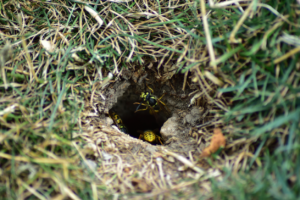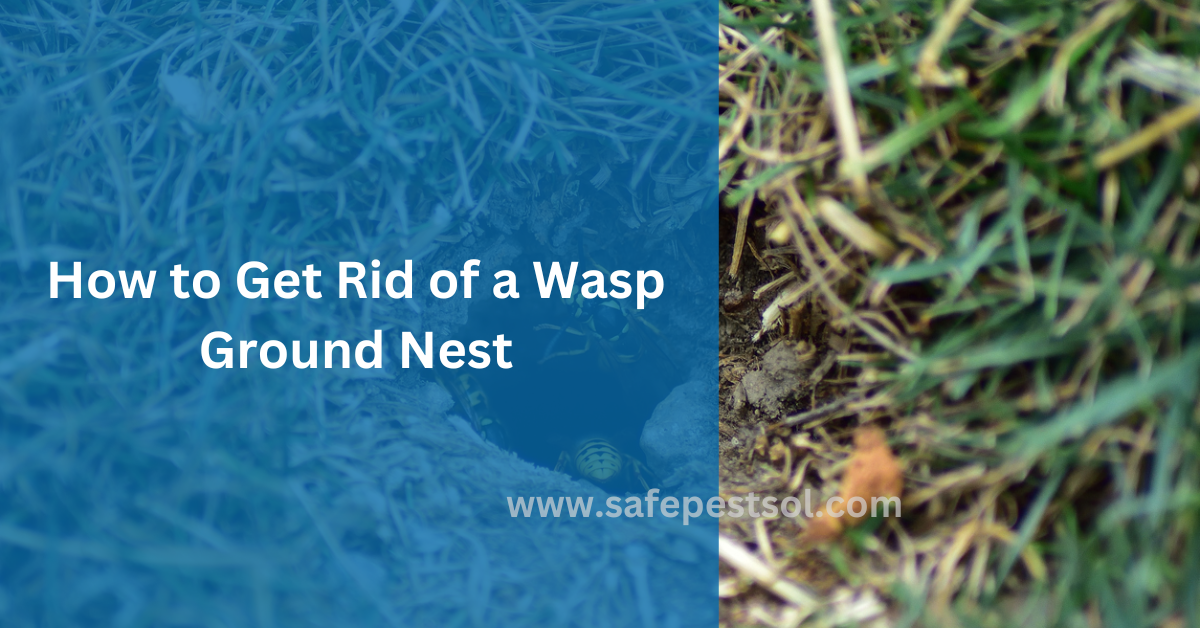How to Get Rid of a Wasp Ground Nest
It is shocking when you see a wasp nest in your garden, especially a ground wasp nest. Ground wasps have underground nests and are generally not noticed until the issue becomes serious.
Although there are very aggressive species, such as yellow jackets, they sting only when threatened. Some of the best approaches to get rid of such species are safe removal and understanding their habits and nesting practices.
This blog will explain everything about wasps’ ground nests to keep your house and garden free from them.

Understanding Ground Wasps
Ground wasps come from the same family as yellow jackets, hornets, cicada killer wasps, and digger wasps. While ground wasps physical characteristics differ, they have a common anatomy.
Most of them have striped bodies with black and yellow color, while some have orange or rust markings. Also, their wings can be black or orange. Moreover, their body dimensions can be 0.5 to 1.5 inches long.
These pests generally bore into the sandy soil to create an underground nest. While some of them are solitary wasps, others, like the social ones, populate in large communal colonies. The most troublesome kinds are hornets and yellow jackets, which sting aggressively when the nest is disturbed.
Understanding Ground Wasps’ Behavior
Wasps are of two types: the solitary wasps and the social wasps.
- Social wasps include species like yellow jackets, paper wasps, and hornets. They build their wasp nests out of a papery material made from chewing wood fiber mixed with their saliva. These insects normally enter into a colony and even provide some protection for a food source.
- Solitary ground wasps prefer living in solitude. The other types, such as social wasps, do not rely on a colony but construct their nests by digging holes in the soil, often in lawns, gardens, or close to plants.
What Do Ground Wasp Nests Look Like?
If you want to know what do ground wasp nest look like, you have to inspect it closely. As these little insects build ground nests, you may notice edges of the soil with small holes measuring about 1.5 inches wide and surrounded by ambient loose dirt.
Many of the species of ground wasps prefer sandy soil, as it is easy for them to dig them into their nests. They may even build their nests near fruit trees, berry bushes, and any other sources of food. At very pluralized sites, you may notice various holes, where each hole is close to the other.
Ways to Get Rid of Ground Wasp Nests Naturally
A ground wasp nest needs to be removed in case it becomes a threat. If a nest is found in a busy area, then removing it may become essential. Here are the most successful and safe ways of eliminating a ground wasp nest.
1. Keep Your Yard Moist
Ground wasps prefer dry soil since it is easy for them to dig into. By keeping your yard damp in late summer and early morning, you can discourage them from nesting.
You can also use fake nest for wasps which can dislocate them far from your home. Watering your lawn multiple times during peak nesting seasons can help reduce the risk of infestation.
2. Use Diatomaceous Earth Around the Nest
Another great natural insecticide is diatomaceous earth. When you spread it around the wasp nest, it dehydrates them, and they die. This may take a few days or so, but it will solve the problem without aggravating any chemicals.
3. Use Soap and Water Directly on the Nest
Mix dish soap with water and pour it into the hole of the nest. To trap the wasps, cover the nest in a breathable fabric. All of the soap coats their bodies, preventing them from flying while flushing the nest with water.
4. Spray White Vinegar on the Nest
Spraying a nest with white vinegar is a natural means of wasp control. These invading wasps become repulsed by the powerful smell of vinegar. The best time for this method is at night when they are least active.
5. Seal the Nest
If the above methods fail, it is time to seal the nest. Try to close all possible holes up with tight-packed straight dirt or plastic. This technique works well on small nests, however, hornets or yellow jackets will easily dig new holes if the colony is fairly large.
6. Apply Peppermint Oil Spray
Wasps hate the smell of peppermint oil. With the help of their weakness, you can try peppermint on them. Start by mixing a few drops with water and spraying it around their nests. This is a great long-term strategy to keep wasps from coming back.
7. Use a Red Light for Night Removal
Use a red light bulb to evacuate the wasp nest at night. Since they cannot see red light, it will help you distract wasps from coming back to their nest.
Are Ground Wasps Dangerous?
Ground wasps are helpful for controlling other insects, but they can become a threat if disturbed. Their stings are particularly painful. Wasps, like yellow jackets or hornets, only sting when defending their nests with several stings. Though their stings are not venomous, in some cases, they create allergic reactions requiring medical rescue.
A clean yard prevents wasp infestations, which requires eliminating possible food sources. Always remember that disturbing their nests may cause infestations. For large colonies, it’s safer to have them professionally handled.
Conclusion
Ground wasps are much important for nature than we think. However, they can cause problems to homeowners when their nests are found in very close human habitats.
There are a lot of natural ways to eliminate them naturally, such as diatomaceous earth, soap and water, or white vinegar. If the infestation is extensive, seeking professional pest control may be the best approach.
FAQs
How can I tell if I have a ground wasp nest?
Look for small holes in sandy soil, often surrounded by loose dirt. If you notice wasps flying in and out of a hole, it’s likely a ground nest.
What time of day is best to remove a wasp nest?
The best time to remove a wasp nest is at night or during the early morning when wasps are less active. This reduces the risk of stings.
Are ground wasps the same as ground bees?
No, ground wasps and ground bees are different. While both nest underground, wasps are more aggressive, while bees are typically non-aggressive and essential for pollination.
Need Help From Professionals?
Sometimes, it is not easy to handle a ground wasp nest on your own. These creatures are aggressive and may sting when disturbed. In such cases, it is essential to get help from professional pest control services like Safe Pest Sol. We are expert in handling ground wasps and removing their nest safely.

